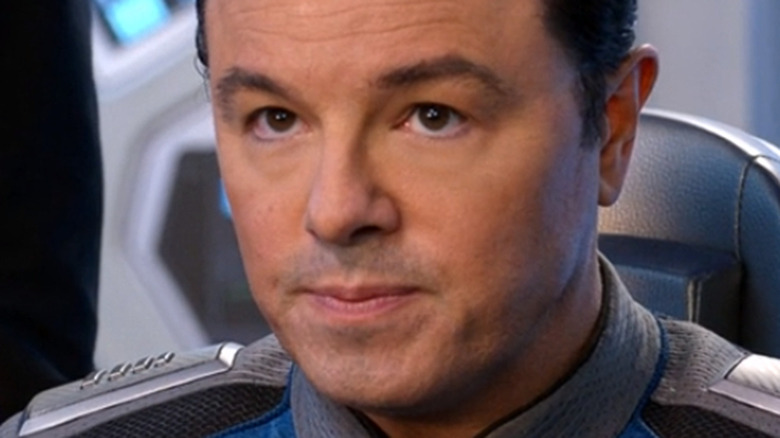Why Some Fans Of The Orville Loathed New Horizons At First
Thanks mainly to the COVID-19 pandemic, the gap between the end of "The Orville" Season 2 and the start of the just-concluded Season 3, dubbed "The Orville: New Horizons," was just over three years long. The new title came with a move from Fox to Hulu and the show came back a little different, with slightly longer and significantly weightier episodes. Creator and star Seth McFarlane steers the ship into all sorts of political and tactical troubles in Season 3, and there seems to be a different moral dilemma with giant stakes for each and every episode.
The previous two seasons of "The Orville" were much heavier on the comedy, while Season 3 brings plenty of poignant drama, including multiple episodes that focus on death. While "The Orville: New Horizons" remains on the road built by the first two seasons, it is evidently carving deeper ruts in fans' minds. While the more serious content definitely brings "The Orville" more in line with its predecessor and inspiration, "Star Trek," the adjustment has definitely come more easily for some fans than it has for others.
After adjusting to the change in tone, fans have come around
The IMDb viewer ratings for "The Orville: New Horizons" certainly reflect this getting-to-know-you period. The first two episodes earned just 7.5 and 7.3 stars out of 10, while the episodes in the second half of the season averaged 8.75 and Episode 9 ("Domino") set the season benchmark with 9.4. Redditor u/1401rivasjakara said as much, posting in r/TheOrville, "At first I hated New Horizons. I missed the humor and I feared it was heading for that all-too-common sci-fi plot basement: more action, less thought. But as a longtime STNG and ST original series fan, I now see they're out to reclaim that vibe and I love it."
Commenter u/hxmxx longed for more comedy in Season 4, and admitted "the shift was jarring, but I am so appreciative it happened." Seth McFarlane told the Hollywood Reporter that the abrupt change in tone gave him and the rest of the show's writers room to ratchet up the show's sociopolitical commentary — one of the many elements that links "The Orville" to "Star Trek." "Rather than watch the news and shout at the TV, it's satisfying to channel some of that into storytelling," he said. "There's just no better genre to me than sci-fi to do that because you can really find ways to engage that aren't just preaching to the audience and proselytizing."
"The Orville" seems to have found its sweet spot, although that spot may be a little tender from all the hammering it took this season. There's no word yet on whether a Season 4 of "The Orville" is coming, but if it does, it seems likely that it will resemble Season 3 more than the previous two.

